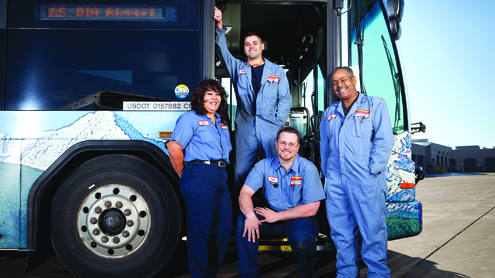
By Phillip A. Washington
Of the many initiatives of Denver Regional Transportation District (RTD), our Strategic Leadership Development Program is one of the most important but least known. While RTD is continually in the public eye as we build out the single largest voter-approved transit program in the nation — the multi-billion dollar FasTracks projects — this innovative and comprehensive curriculum designed to train and empower tomorrow’s industry leaders has remained somewhat under the radar.
The Strategic Leadership Development Program integrates a five-step curriculum that develops both salaried and represented qualified employees for senior management positions. The program fosters growth at every step of the career path through classroom instruction, on-the-job training, life-skills assessments mentoring and collaborations with transit agency peers, organizations and policymakers. Our Multi-Agency Exchange (MAX) is another compelling aspect of this program. Representatives from various transit agencies share ideas, best practices and discuss real-world operational challenges in a cooperative study environment.
Denver RTD is developing its most important asset — our human capital. We are creating an array of possibilities for advancement that will serve our industry well into the future. In short, we are becoming the “farm team” for the industry.
Transit industry fundamentals
Through entry-level internships and a structured workforce development initiative, employees acquire basic vocational skills and foundational transit-related work experience, and receive an introduction to a wide spectrum of potential careers in public transit.
Employee development
Training continues with a series of classes and personal learning paths to provide employees the knowledge and skills needed to succeed in their current positions. These paths also emphasize advanced supervisory, management and leadership abilities to prepare employees for future advancement within our organization.
Mid-level leadership
Once at a supervisory or management level, selected employees benefit from advanced education to further develop the competencies necessary to excel as transit leaders.
Senior-Level Knowledge Exchange
Working collaboratively, representatives of participating transit agencies in Dallas, TX, Los Angeles, CA, and Denver, CO, share ideas, compare best practices, and position themselves as employers of choice within our industry. They also cultivate strategies to attract, foster, and retain exceptional management teams.
Both the MAX Program and Leadership APTA programs prepare participants as the next generation of middle and executive management in the transportation industry through extensive inter-agency networking, cooperative communication efforts, and transit-specific learning paths.
Executive Leadership
Leaders themselves at this stage, nominated executives continue to hone their skills in critical thinking and strategic change by participating in nationally recognized, advanced leadership seminars and conferences.
In addition to these incremental development programs, we are identifying positions that are difficult to fill in each department at RTD due to either ongoing applicant shortages or the highly specialized skills required to fulfill the job. We then identify and outline a training path to “grow our own” for that particular hard-to-fill position.
This enables us to create and then tap into an existing pool of qualified leaders who are already familiar with the organization and ready to step up and meet these new challenges. This helps us maintain crucial institutional knowledge.
We are accomplishing much throughout the Denver metro area by proudly serving as a model for progress. We feel it is critical that we continue to make a positive impact on current operations and establish a vision for the future with leadership well prepared for the challenge.
As leaders ourselves, we must continue to set the tone for developing our people and our industry in a way that best leverages resources, maximizes benefit, awards innovation and fosters success.
